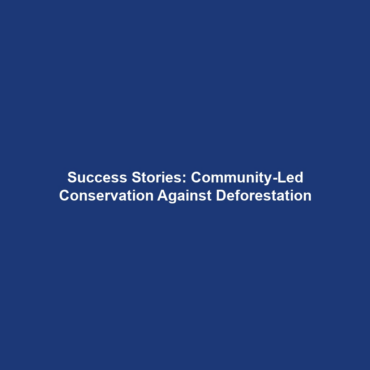Case Studies of Community-Led Conservation Programs in Relation to Deforestation & Biodiversity Loss
Introduction
Deforestation and biodiversity loss pose significant threats to the planet, impacting ecosystems, wildlife, and human societies. Community-led conservation programs, such as eco-tourism in Madagascar and participatory forest management in Nepal, represent vital strategies to mitigate these challenges. These programs engage local communities in conservation efforts, fostering sustainable practices while addressing the urgent need to preserve biodiversity. This article explores the significance of these initiatives within the context of deforestation and biodiversity loss, highlighting successful case studies that serve as models for other regions.
Key Concepts
Community Engagement in Conservation
Community-led conservation programs leverage local knowledge and cultural heritage to create effective strategies for environmental preservation. The key principles include:
- Empowerment: Engaging local populations in decision-making enhances stewardship of natural resources.
- Sustainability: Programs focus on balancing ecological health with economic viability.
- Collaborative Management: Stakeholders, including governments, NGOs, and communities, work together to set and achieve conservation goals.
Applications and Real-World Uses
Eco-Tourism in Madagascar
Eco-tourism initiatives have transformed the economy of Madagascar while promoting conservation. The model showcases how eco-tourism is used as a tool for biodiversity conservation, funneling financial resources back into local communities while educating visitors about the importance of preserving unique ecosystems.
Participatory Forest Management in Nepal
In Nepal, participatory forest management practices empower local communities to manage forest resources sustainably. This approach not only aids in combating deforestation but also enhances biodiversity through the sustainable utilization of forest products. The integration of local customs and participatory planning has shown significant success in preserving Nepal’s rich biodiversity.
Current Challenges
Despite their benefits, community-led conservation programs face several challenges, including:
- Funding Limitations: Sustainable financial support is often lacking, hampering long-term project viability.
- Cultural Barriers: Varying cultural perceptions can hinder community participation and commitment.
- Policy Constraints: Inadequate legal frameworks can limit the effectiveness and sustainability of conservation initiatives.
Future Research and Innovations
Future research into community-led conservation programs is essential for their evolution. Innovations such as the use of remote sensing technology and community-based monitoring are promising areas of development. These technologies facilitate real-time data collection and analysis, allowing communities to make informed decisions regarding resource management and conservation efforts. Furthermore, integrating eco-centric technologies into these frameworks can enhance the overall impact on deforestation and biodiversity loss.
Conclusion
Community-led conservation programs, such as eco-tourism in Madagascar and participatory forest management in Nepal, play a crucial role in addressing deforestation and biodiversity loss. By engaging local communities in sustainable practices, these initiatives not only protect vital ecosystems but also empower the people who depend on them. To support these efforts, stakeholders must focus on addressing funding challenges and investing in research that fosters future innovations. For more information, explore our other articles on biodiversity conservation and sustainable practices.
